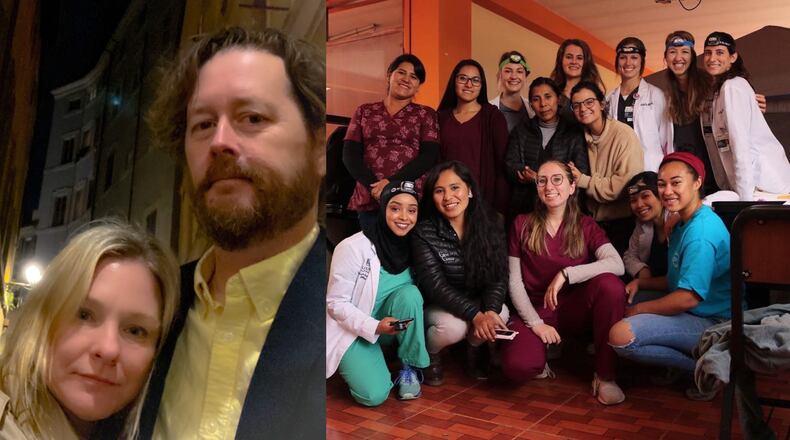An Atlanta couple fleeing Rome. Georgia college students stuck in Peru. A Norcross native under a self-imposed quarantine in Germany.
They were all far from home when the coronavirus went global.
Elizabeth Moore was vacationing in Italy with her husband, Jeff, while their son was traveling with his school on spring break. Will Thomas was working in Germany in a U.S. State Department exchange program. Aya Mansour was volunteering at a health clinic in Peru as part of her studies at the University of Georgia.
Their experiences illustrate the turbulence wrought by the global reaction to a virus that caught the world flat-footed.
The Moores feared they would be trapped in Rome, separated from their teenage son. Then, as Germany prepared to shut its borders, the United States suspended Thomas’ program, ending his job and ordering him home, though he cannot go yet. Mansour was trying to book a flight home Sunday when Peru closed its borders. Now, she and several other Georgia students are stranded in their dorms as armored vehicles patrol the streets during a nationwide quarantine.
“Our main concern is that the quarantine will be extended past the 15 days,” Mansour said, “and then we won’t have a way to get back home.”
The Moores had last-minute jitters about their trip, but their Italian travel agent assured them just before the flight in late February that everything was fine. At first, Rome was lovely, but that changed within a few days. A priest fell ill with the virus and his church was closed. Then, they heard the borders might close.
“We have to get out of here,” they told each other. They found a flight to New York and assumed the worst was behind them when they touched down. They planned to spend a night in the Manhattan apartment they keep for business, before continuing to Atlanta.
A conversation changed their plans.
While doing laundry, Moore chanced upon an older tenant and mentioned their trip. Signs soon appeared on doors, warning that tenants had just returned from Italy. The Moores called their doctor and didn’t feel ill but thought it prudent to lock themselves in for two weeks anyway. Near the end, they got disturbing news about their 14-year-old son, by now back in Atlanta and staying with friends: He’d injured himself while diving for first base in a ballgame.
They booked a flight home last weekend and got him to a doctor Monday. Their son, who had downplayed his injury, has his right hand in a cast. They had barely arrived in time: The doctor told them he was closing his office for three weeks.
In Germany, Thomas, 22, is under a self-imposed quarantine. Unlike the Moores, he does not want to come home, but with the exchange program canceled, he no longer has a job and his visa will soon be revoked. There is a complication, though: Days ago, he learned that someone in his office — he worked for a member of the German parliament — tested positive for COVID-19, the disease caused by this coronavirus. He doesn’t want to return and infect his parents or his girlfriend, but has nowhere else to live. He thinks Germany’s medical system and social programs are better equipped to handle the pandemic, but he is also alone in a foreign country.
“I’m OK here,” he said Wednesday afternoon, as he awaited his COVID-19 test results, “but I’d rather not be in self-quarantine all by myself.”
Mansour, in Peru with students from Georgia, Alabama and North Carolina, wants out now. They have eggs, pasta and Oreo cookies to last a week, they said in calls Tuesday and Wednesday. “We have a lot of junk food,” said Erica West, 25, a student from Augusta University who is studying to be a physician assistant. “We are all in a safe situation now, but we don’t know how long that will last.”
They started getting nervous Friday when the hospitals where they do clinical rotations began to bar their access. Then, on Sunday, they heard that a U.S. airline was ending service. They started booking travel home, but it was too late. That evening, President Martín Vizcarra announced the borders would be closing at 11:59 p.m. Monday.
>>CORONAVIRUS IN GEORGIA: complete coverage
Monday morning, they piled into taxis and drove a half-hour to the nearest American consulate, only to find a note taped to the door: closed. It included an emergency phone number, but the number was incorrect, said Mansour, 22, a UGA senior majoring in health promotion. They eventually found the correct number but couldn’t get through as of Wednesday afternoon. They are in frequent contact with their families and the universities and said everyone is working to get them home, calling members of Congress, the governor’s office, the embassy.
The University of Georgia, Augusta University and other academic institutions are working with the State Department to get them home, university spokesmen said.
On the website for the U.S. Embassy in Peru Wednesday was a statement that Americans in the country should arrange lodging "for the duration of the quarantine period."
Meanwhile, the students are hunkered down in their dorms over a clinic in Cusco. They aren’t allowed in the streets unless it’s for groceries or medical care, and they are running low on cash. They feel secure but would feel better if they were in the United States, with a familiar health system, said Nurin Ghazzawi, 26, another Augusta University student.
“If this pandemic spreads like wildfire,” she said, “how are we to get home safely?”
About the Author
Keep Reading
The Latest
Featured






